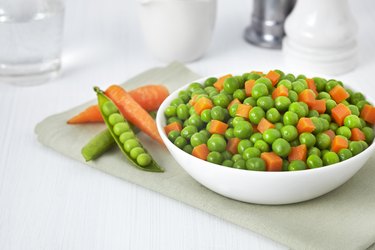
There have been claims that frozen foods are not as nutritious as fresh foods, but that actually isn't true. In fact, freezing helps food retain its vitamins and minerals over time. Of all of the frozen foods available, Philadelphia-based registered dietitian Emily Wunder, RD, LDN, highly recommends having frozen peas stocked in your freezer at all times.
Most people know green peas as a legume, but according to the USDA Dietary Guidelines, legumes are still considered vegetables. "Frozen peas have the health benefits of a starchy vegetable while also providing a source of plant-based protein," Wunder says.
Video of the Day
Video of the Day
Benefits of Frozen Peas
Besides being high in protein, frozen peas may offer more than fresh or canned varieties. Check out some of the key benefits of frozen peas below.
They're Higher in Nutrients Than Unfrozen Varieties
Fruits and vegetables are the most nutrient-dense when they are first harvested, and they start to slowly degrade and lose nutrients thereafter, according to the University of California, Davis (UC Davis).
Fresh peas are picked at peak ripeness, then blanched and frozen. The blanching process, which involves briefly submerging the peas in boiling water, stops enzyme activity that would otherwise cause them to spoil and lose nutrients over time, per UC Davis. Freezing them in this state helps preserve the freshness and nutrient content of the peas, extending their lifespan and giving you more of the good stuff.
They Last Up to a Year
Green peas can generally stay fresh in the fridge for five to seven days before they start to spoil. On the other hand, frozen peas can be kept in the freezer and used within 12 months.
And while canned peas may last for years in your pantry, the canning process does remove nutrients, per UC Davis. Canning exposes fruits and vegetables to high temperatures, which degrade heat-sensitive vitamins and nutrients such as vitamin C. Canned products may also contain additives such as salt and other preservatives.
They Provide Fiber
A cup of cooked peas provides about 8 grams of dietary fiber — a nutrient the USDA Guidelines say we need to get more of. "This is a good serving of fiber to help reach those daily recommendations of 25 to 38 grams for adults," Wunder says. Eating high-fiber foods like peas has been linked to improved digestive health, lower cholesterol levels and control blood sugar levels, according to the Mayo Clinic.
Peas also serve as a great source of vitamins and minerals like vitamins A, C, K, potassium, iron and magnesium. "And peas have lower amounts of carbs compared to other starchy vegetables like potatoes," Wunder says.
How to Cook Frozen Peas Without Losing Nutrients
While frozen peas are a good source of nutrients, some can be lost during the cooking process. Some vitamins are water-soluble and some are sensitive to heat. Boiling vegetables like peas has been shown to cause the most nutrient loss, according to one April 2018 study in Food Science and Biotechnology.
That being said, steaming is one of the gentlest ways to cook peas while retaining nutrients, according to Wunder. Following steaming, you can also bake or roast peas in the oven or sauté them on the stove in oil or butter. Just make sure that whichever cooking method you choose, you use the least amount of water possible.
To preserve the nutritional value of peas, Wunder recommends preparing frozen peas by:
- Steaming them with mushrooms
- Sautéing and adding them to fresh pasta with oil, lemon and parmesan
- Puréing them with olive oil, lemon, garlic, nuts and parmesan cheese to make a tasty pesto
- Frying them in an air fryer to create a crispy snack or food topping with seasonings of your choice
Frozen Pea Recipes to Try at Home
Now that you're ready to stock up and chow down, check out some of our favorite frozen peas recipes below.
- University of California, Davis: Mazimizing the Nutritional Value of Fruits and Vegetables
- Food Science and Biotechnology: “Effect of different cooking methods on the content of vitamins and true retention in selected vegetables”
- Mayo Clinic: Dietary Fiber
- Dietary fiber: Essential for a healthy diet